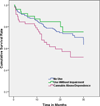Alcohol confounds relationship between cannabis misuse and psychosis conversion in a high-risk sample
- PMID: 25572323
- PMCID: PMC4537180
- DOI: 10.1111/acps.12382
Alcohol confounds relationship between cannabis misuse and psychosis conversion in a high-risk sample
Abstract
Objective: Cannabis use has been examined as a predictor of psychosis in clinical high-risk (CHR) samples, but little is known about the impact of other substances on this relationship.
Method: Substance use was assessed in a large sample of CHR participants (N = 370, mean age = 18.3) enrolled in the multisite North American Prodrome Longitudinal Study Phase 1 project. Three hundred and forty-one participants with cannabis use data were divided into groups: No Use (NU, N = 211); Cannabis Use without impairment (CU, N = 63); Cannabis Abuse/Dependence (CA/CD, N = 67). Participants (N = 283) were followed for ≥2 years to determine psychosis conversion.
Results: Alcohol (45.3%) and cannabis (38.1%) were the most common substances. Cannabis use groups did not differ on baseline attenuated positive symptoms. Seventy-nine of 283 participants with cannabis and follow-up data converted to psychosis. Survival analysis revealed significant differences between conversion rates in the CA/CD group compared with the No Use (P = 0.031) and CU group (P = 0.027). CA/CD also significantly predicted psychosis in a regression analysis, but adjusting for alcohol use weakened this relationship.
Conclusion: The cannabis misuse and psychosis association was confounded by alcohol use. Non-impairing cannabis use was not related to psychosis. Results highlight the need to control for other substance use, so as to not overstate the cannabis/psychosis connection.
Keywords: alcohol use; cannabis use; clinical high-risk; prodromal states; psychosis; substance use.
© 2015 John Wiley & Sons A/S. Published by John Wiley & Sons Ltd.
Conflict of interest statement
No other authors report conflict of interests.
Figures
References
-
- Green B, Young R, Kavanagh D. Cannabis use and misuse prevalence among people with psychosis. Br J Psychiatry. 2005;187:306–313. - PubMed
-
- Moore THM, Zammit S, Lingford-Hughes A, et al. Cannabis use and risk of psychotic or affective mental health outcomes: a systematic review. Lancet. 2007;370:319–328. - PubMed
-
- Yung AR, Phillips LJ, Yuen HP, McGorry PD. Risk factors for psychosis in an ultra high-risk group: psychopathology and clinical features. Schizophr Res. 2004;67:131–142. - PubMed
Publication types
MeSH terms
Grants and funding
- U01MH081902-05/MH/NIMH NIH HHS/United States
- R01 MH061523/MH/NIMH NIH HHS/United States
- R18 MH43518/MH/NIMH NIH HHS/United States
- U01 MH081902/MH/NIMH NIH HHS/United States
- P50 MH080272/MH/NIMH NIH HHS/United States
- U01 MH081988/MH/NIMH NIH HHS/United States
- P50 MH066286/MH/NIMH NIH HHS/United States
- R01 MH062066/MH/NIMH NIH HHS/United States
- R01 MH043518/MH/NIMH NIH HHS/United States
- K05 MH001654/MH/NIMH NIH HHS/United States
- K24 MH76191/MH/NIMH NIH HHS/United States
- 5U01 MH081988/MH/NIMH NIH HHS/United States
- R01 MH065079/MH/NIMH NIH HHS/United States
- U01 MH082022/MH/NIMH NIH HHS/United States
- U01 MH081984/MH/NIMH NIH HHS/United States
- R01 MH60720/MH/NIMH NIH HHS/United States
- K23 MH001905/MH/NIMH NIH HHS/United States
- U01 MH066069/MH/NIMH NIH HHS/United States
- U01 MH066160/MH/NIMH NIH HHS/United States
- K24 MH076191/MH/NIMH NIH HHS/United States
- R01 MH65079/MH/NIMH NIH HHS/United States
- K05 MH01654/MH/NIMH NIH HHS/United States
- R01 MH081861/MH/NIMH NIH HHS/United States
- U01 MH066134/MH/NIMH NIH HHS/United States
- U01 MH 066160/MH/NIMH NIH HHS/United States
- R01 MH060720/MH/NIMH NIH HHS/United States
- U01 MH081928/MH/NIMH NIH HHS/United States
- R37 MH043518/MH/NIMH NIH HHS/United States
- R01 MH085560/MH/NIMH NIH HHS/United States
- U01 MH081857/MH/NIMH NIH HHS/United States
- U01 MH082004/MH/NIMH NIH HHS/United States
- U01 MH081944/MH/NIMH NIH HHS/United States
LinkOut - more resources
Full Text Sources
Other Literature Sources
Medical
Research Materials


